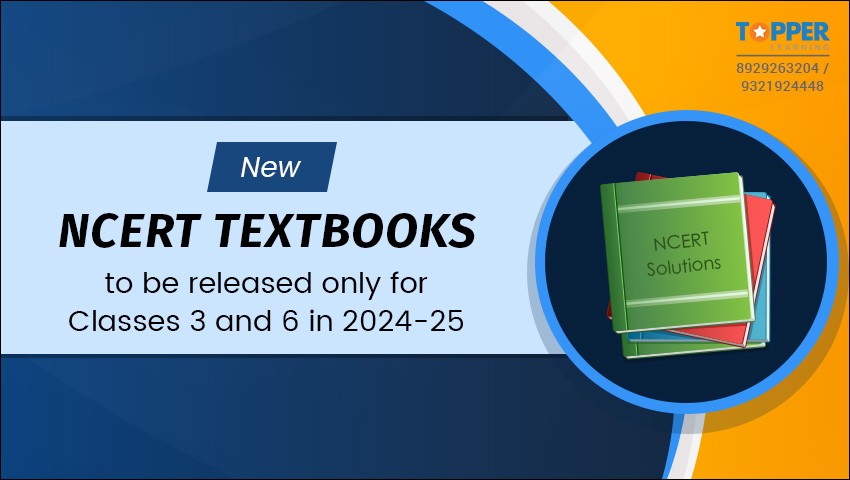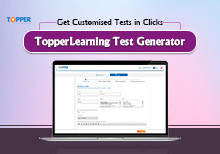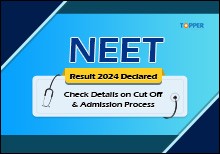New NCERT textbooks to be released only for Classes 3 and 6 in 2024-25

For the academic session 2024-25, CBSE has announced new syllabi and textbooks for classes 3 and 6. The materials are yet to be disseminated among schools. There is no change in the curriculum and textbooks for other classes for 2024-25.
By Topperlearning Expert 27th Mar, 2024 | 05:45 pm
ShareNCERT textbooks are widely used to teach students enrolled in CBSE-affiliated schools. With the wide impact of the curriculum in setting the base for students to ace numerous national competitive exams, the syllabus is crafted with care to meet the standards. Therefore, in a recent announcement, CBSE has introduced and communicated the changes in textbooks for classes 3 and 6 for the session 2024-25.
Major Announcement From CBSE
CBSE announced on March 18 the introduction of new syllabi and new textbooks to be published by NCERT for classes 3 and 6 students. The announcement is for the 2024-2025 session, which is scheduled to commence from April 1. Adding to the teacher's aid, the CBSE will also organise capacity-building programs. These are aimed to enlighten the school heads and teachers about ‘new teaching-learning perspectives’ according to NEP-2020.
It must be noted that the syllabi and textbooks are still under development, as NCERT has informed. The date of release has not yet been announced. However, it is scheduled to be soon followed by online dissemination. The sudden changes or newer courses are challenging to understand. In view of this, the CBSE will also be releasing a ‘bridge course’ for class 6 and will offer concise guidelines for class 3. These are specifically aimed at ensuring an easy transition for students.
Other than these two classes, the textbooks and syllabi for up to 12th grade remain the same and are available on the CBSE official website.
Implementation of a Newer Curriculum
CBSE recommends that schools set up a School Curriculum Committee, which will comprise teachers from each area. Having a role in assisting the implementation of a newer curriculum, their duties will include the following:
- Defining activities for pedagogical practices.
- Curate the plan of assessment and feedback mechanism.
- Ensure age appropriateness, gender sensitivity, incorporation of inclusive principles and valid content in textbooks and/or reference materials.
- Validate to avoid the presence of any content holding the potential to hurt the sentiments of the community.
- Develop a method to reflect on the reviews and associated issues.
- Ensure popper implementation of the decided methodologies.
- Compliance of reference materials with principles of the Constitution of India and compliance with NEP-2020.
Methodologies For Implementation
The following methodologies are suggested to be incorporated to enhance the quality of learning:
Multilingualism
It is encouraged to include multilingual and multicultural learning. It is to foster national understanding in an interdependent society. These two are also emphasised to promote national integration.
Art-Integrated Education
The CBSE focuses on combining Art Education and art-integrated education. Art education is deemed essential to develop creativity and art-based enquiry skills. Concerning the same, CBSE recommended promoting Visual and Performing arts-based subjects at Secondary and Senior Secondary Levels.
Pedagogical Planning
CBSE also encourages schools to include pedagogical plans and innovative experiential learning. It must be done via art-integrated methodologies or other creative methods. The School Curriculum Committee must do it with the guidance of the school principal– the pedagogical leader of the school. CBSE advises the committee to integrate innovations in pedagogy through:
- Experiential learning: Encouraging learning through experience.
- Activity-centred: Including activities in learning.
- Toy-based pedagogy: Using toys for learning.
- Storytelling: Includes creative touch.
- Gamification: Encouraging include games to increase participation.
- Sport and art Integrated learning: Include sports and art into activities and learning.
21st Century Skills
The three 21st-century skills must also be incorporated, which are:
- Learning Skills: These skills will include critical thinking, communication, creativity, and collaboration.
- Literary Skills: These skills will include information, technology, and media literacy.
- Life Skills: These skills will include self-awareness, initiative, leadership, flexibility, and productivity.
Conclusion
The NCERT text material is challenging to decipher without guidance. Yet, holding immense value owing to being the reference material for various nationally critical competitive exams, a thorough understanding of the books is important. Regardless of the changes, at TopperLearning, we have experts in every aspect ready to aid the students.
Find the top CBSE materials for every class here. The video lessons, textbooks, textbook solutions, sample papers and much more are all available at TopperLearning. Further, study materials for ICSE, Maharashtra Board, JEE and NEET are also available to all candidates aspiring to learn.
TopperLearning is now on WhatsApp Channels!
Subscribe today by clicking the link and stay updated on the latest current affairs, study tips, our latest offerings, and more. Click here
FAQ's
Q 1. Which framework will the new curriculum be part of?
Ans : The changes in syllabi and textbooks will be part of the framework provided in National Education Policy (NEP) 2020. To be specific, the modifications are part of the New National Curriculum Framework for School Education (NCF-SE) 2023.
Q 2. Will other classes be affected by the new modules?
Ans : No, classes other than 3 and 6 will not witness any change in their study materials.
Q 3. What subjects of class 6 are available on TopperLearning?
Ans : The subjects covered at TopperLearning are Maths, Science, Social studies, Hindi and English.
More from Education
Important Resources
- Education Franchisee opportunity
- NCERT Solution
- CBSE Class 9 Mathematics
- NCERT Solutions for class 10 Science
- Sample Papers
- CBSE Class 9 Science
- NCERT Solutions for class 10 Maths
- Revision Notes
- CBSE Class 10 Hindi
- CBSE Class 10 English
- CBSE Class 10 English
- CBSE Class 10 Social Studies
- CBSE Class 10 Science
- CBSE Class 10 Mathematics
- Career In Science After 10
- Career In Commerce After 10
- Career In Humanities/Arts After 10
- NCERT Solutions for Class 10
- NCERT Solutions for Class 11
- Business Studies Class 12 CBSE project





